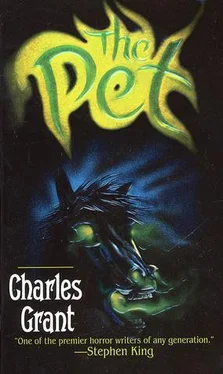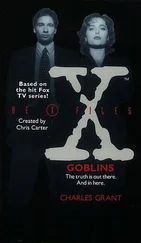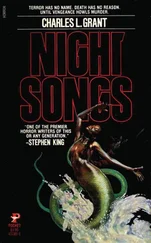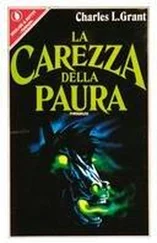“But Dad—”
“Do as you’re told! Go down to my office.”
Don looked to the chemistry teacher, who was smiling smugly, looked to the kids still in the hall, whispering and grinning. The odor of rotten eggs was making him sick. Boyd stoppered the vial with his handkerchief and gave the order a third time.
“Yeah,” he muttered, turned, and walked away.
“Hey, Don,” someone called as he went through the door, “tell him the giant crow did it!”
Norman slouched in his chair, a hand on one cheek, one eye closed as if sighting an invisible weapon. There was a stack of reports to be filed when he found the time to read them, the in basket was crowded with letters to respond to, the out basket held more files he hadn’t bothered to look over, and in the middle of the blotter was Adam Hedley’s vial with the handkerchief still dangling from the top.
A finger reached out to touch it, poke at it, shift it around, before the hand drew back and covered his other cheek.
Norm boy , he thought, for an intelligent man, you are one very stupid sonofabitch.
A chill settled on the back of his neck and he shuddered violently to banish it, and glanced up to see that the office was dark. A look behind and out the window, and he groaned; the sun had gone down, the streetlamps were on, and the traffic on School Street was mainly people coming home from shopping and work.
He was virtually alone, then, in the building. Just him in his office, and the custodial staff sweeping the hallways and auditorium, washing the blackboards, and probably stealing him blind from the supply room in the basement.
“Stupid,” he muttered, staring at the vial. “Stupid, and dumb, and you ought to be shot.”
Jesus, how could he believe Don had really tossed that bottle into Hedley’s room? How could he believe it? Or was he trying too hard to believe the boy was really normal, doing normal things like any normal kid.
That was the problem — thinking Don was special. He wasn’t. He was perfectly, sometimes unnervingly fine, with quirks like any other kid to set him apart. And there was Norman Boyd, forgetting who they both were and playing King of the Mountain, Lord of the Hill, laying down the law as if he were Moses.
As if he were his own father.
For the first time in ages he wished Joyce were here, to remind him that he wasn’t Wallace Boyd still working the mills, that Don wasn’t Norman struggling out of the gutter. He recalled with a silent groan the day Joyce had told him she was pregnant the first time. He had sworn on everything he held dear that he would do better, that he would be there — a harbor for childhood storms, a rock to hang on to when the winds grew too strong. A father; nothing more, nothing less.
He covered his face with his hands and took a deep breath.
It was the pressure, that’s what it was. After Sam had died, the pressure had begun; he didn’t know how, and he wasn’t sure why, but it was there. Waiting for him.
Whispering to him that Donald had to be protected at all costs. And when he recognized the futility of it, and the unreason, he hadn’t realized how far in the opposite direction he had gone with the boy’s life.
It was the pressure.
What he needed was a respite. What he needed was for Falcone and his teachers to cave in and stop the strike. Then they’d be off his back, and the board would be off his back, and the press and the mayor and the whole damned world would leave him alone to reacquaint himself with his son.
Twice he had blown it — first, Don’s announcement about being a veterinarian, and now this afternoon.
Twice, and suddenly he was very afraid.
His wife was falling out of love with him.
What would happen if his son did the same?
… and so the crow saw how bad the little boy was feeling, and he flew out of the tree and into the night …
The park was deserted. A breeze crept through the branches and shook loose a few leaves, spiraling them down through the dark, through the falls of white light, to the ground, to the paths, to the pond where they spun in lazy turns, creating islands that floated just below the surface.
No one walked.
The traffic’s noise was smothered.
… and found the evil king alone in his bedroom, and he flew in through the window, and before the evil king could wake up and defend himself, the giant crow had plucked out both his eyes!
The only concentrated light was set around the oval. A dim light, and there was no warmth to it, no weight, as he sat on a bench and stared at the water, rolling his shoulders to drive off the cold.
His eyes were closed.
His lips moved so slightly they might have been trembling.
And then the giant crow flew through the castle until he found the evil king’s brother, who was just as evil and just as mean, and the giant crow tore out his throat with one swipe of his giant talons.
The houses that faced the park were hidden by the trees and the width of the land, and the boulevard that ran past it on the south was too far away to matter. He was alone; no one would bother him unless he stayed until dawn, and on a night like this not even a tramp would try to make a bed on the redwood benches. He was alone. His hands were clasped tightly between his knees, and his jacket was too light for the sudden temperature drop, turning the air brittle and the leaves to brown glass.
A noise in his throat; his shoulders slumped a little more.
He had waited nearly an hour in his father’s office before the man finally walked in. Don had jumped to his feet and was ordered down again. A fussing with papers, instructions not to interrupt him, and he was lectured forever on the image both of them had to project — to the faculty as well as to the student body. Norman brandished the vial as if he were going to throw it. Don explained for the second time how the kid — he was sure now it was Pratt — shoved the bottle into his hand on the way down the stairs. His face hurt as he talked, and he kept touching the side of his face to be sure it hadn’t bloated. His father saw the situation, sympathized for the injury, but refused the whole pardon while relenting to the degree that he supposed Brian was capable of such a trick.
“I didn’t say it was him.” Don had retreated, suddenly fearful his father would call the boy in and unknowingly start a war. “I just think it was.”
Norman seemed doubting, and Don didn’t understand. In all his life he’d never done anything like that; he had been told often enough that he was neither to take advantage of his position — whatever that was — nor pretend he was only one of the boys. He wasn’t. He was, by fate, special, with special problems to handle. And Norman expected more of him than to have it end up like this.
“End up like what?” He sprang to his feet and approached the desk. “Dad, why don’t you listen to me? I didn’t do it!”
Norman stared and said nothing.
“All right, I left the nurse’s office when I shouldn’t have, I guess, and I wrote out my own pass. All right, that’s wrong. Okay. But I did not throw that crap in Mr. Hedley’s room!”
“Donald,” his father said in perfect control, “I will not have you speak to me that way, especially not in here.”
“Oh, Jesus.” And he turned away.
“And you will not swear at me. Ever.”
Don surrendered. Suspended between belief and suspicion, bullied off the subject by time-worn and weary pronouncements, he surrendered, he didn’t care, and he didn’t argue when he was given six days detention, beginning the next day.
“You should count yourself lucky,” Norman said as he escorted him out the door just as the last bell rang. “Most other kids would have been suspended.”
Читать дальше












